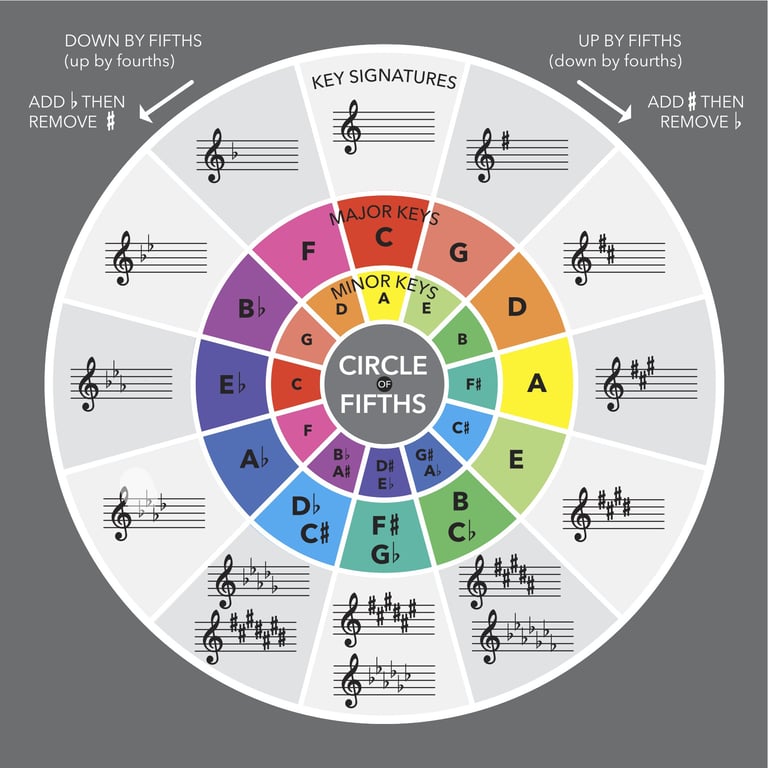The Power of Music Theory: Your Key to Becoming a Better Musician
Ever wondered what makes great musicians sound so effortless? The answer lies in music theory! This fun and insightful guide breaks down the basics - from scales to chord progressions - showing you how theory can supercharge your skills, spark creativity, and make learning music easier than ever. Whether you're just starting out or looking to level up, we have tips you need to play smarter and sound better. Let's dive in!
SKILL DEVELOPMENTMUSIC EDUCATION
The Power of Music Theory: Your Key to Becoming a Better Musician
Ever felt like music theory is this huge, complicated puzzle that only professional musicians can solve? You're not alone! But here's the truth — music theory isn't just about technical jargon and complex diagrams. It's actually an amazing tool that can unlock your creativity, sharpen your skills, and make you a better musician overall.
Whether you're just starting out or you've been playing for years, learning a bit of theory can take your music to the next level. Let's dive into how it works and why it's so powerful.


What is Music Theory Anyway?
Think of music theory as the "grammar" of music — it's the set of rules that explain how notes, rhythms, and harmonies come together to create the songs we love. By understanding it, you’ll be able to read, write, and even improvise music with confidence.
Why Learning Music Theory is a Game-Changer
Music theory helps you understand scales, chords, and key signatures — the building blocks of music. Once you know these, you’ll start to recognise patterns on your instrument, making playing smoother and easier.
For example, if you're a pianist, knowing scales helps you understand common hand positions and fingerings, making even challenging pieces feel more manageable. For guitarists, recognising chord shapes and their relationships allows for quicker transitions and creative chord voicings. Drummers can use theory to grasp rhythmic patterns and subdivisions, improving timing and feel.
Practicing scales and arpeggios isn’t just about muscle memory; it's about knowing why those patterns work. When you understand the theory behind it, your playing becomes way more intentional and precise.
1. It Supercharges Your Technique ⚡️
Improvising isn’t just about guessing what sounds good — there’s actually a method to the madness! Knowing chord progressions, scales, and modes gives you a solid foundation for creating amazing solos or melodic lines on the spot.
For example, once you know that the pentatonic scale sounds great over blues progressions or that the Mixolydian mode gives a bright, edgy feel, improvising becomes so much easier. Jazz musicians rely heavily on chord extensions and altered scales, while rock guitarists often use the minor pentatonic for expressive solos.
Understanding which notes create tension and which resolve that tension is key. This knowledge allows you to craft solos that feel intentional and emotionally powerful.
2. It Makes Improvisation Feel Natural 😌
Ever wondered why some chord progressions just feel right? Music theory has the answers. By learning about progressions, modulations, and harmonic tension, you can write songs that captivate listeners.
Take the famous I-V-vi-IV progression — it's been used in countless hits because it just works. Understanding these patterns means you can start creating your own catchy hooks and emotional moments in your songs.
Beyond chord progressions, theory helps with melody writing. Knowing about phrasing, motifs, and counterpoint allows you to build memorable and engaging melodies. Understanding rhythm patterns also helps create grooves that draw listeners in.
3. It Supercharges Your Songwriting 🎤
Music theory helps you spot patterns and predict what’s coming next. Whether you’re sight-reading sheet music or learning a song by ear, recognising common structures like chord shapes or melodic intervals can make the process much quicker.
For example, if you're playing a Bach piece and recognise a series of arpeggios based on a I-IV-V pattern, you can anticipate what's coming next instead of decoding each individual note. Guitarists can spot common chord progressions that make songs easier to memorise.
Ear training is also a huge plus. When you train your ear to identify intervals, chords, and rhythms, you’ll find it easier to play along with other musicians and pick up songs just by listening. This skill is invaluable in jam sessions, rehearsals, and even professional recording environments.
4. It Helps You Read and Learn Music Faster 🎼
When you understand music theory, you can communicate better with other musicians. Terms like "modulate to the dominant key," "play a diminished seventh chord," or "use syncopation here" give clear instructions that make rehearsals smoother.
For example, if you're playing in a band and the guitarist wants to switch to a different key, knowing what "modulate to the relative minor" means will keep everyone on track. Theory also helps you quickly analyse sheet music or chord charts during rehearsals, saving time and ensuring you’re prepared for changes in tempo, dynamics, or key.
Whether you're playing in a band, orchestra, or just jamming with friends, this shared language helps everyone stay on the same page.
5. It Makes Playing with Other Musicians a Breeze 🍃
Must-Know Music Theory Basics
Here are some key concepts that every musician should get familiar with:
Scales and Modes: These are the building blocks of melody and improvisation. Learning modes like Dorian, Phrygian, or Lydian can expand your creative toolbox and add flavour to your compositions.
Chord Progressions: Knowing patterns like ii-V-I or I-IV-V can unlock hundreds of songs. Understanding cadences (like the perfect cadence or plagal cadence) helps you create satisfying resolutions in your music.
Rhythm and Time Signatures: Mastering these improves your timing and groove. Exploring syncopation, polyrhythms, and odd time signatures can add excitement and complexity to your music.
Intervals: Recognising these helps with everything from harmonising to writing melodies. For example, a major third gives a bright sound, while a minor sixth creates tension and drama.
Key Signatures and Modulation: Knowing how keys work makes changing tonal centres feel natural. This skill is vital for jazz, classical, and progressive rock musicians who frequently shift keys.
How to Start Learning Music Theory
Start Small: Focus on scales, intervals, and basic chord structures before diving into advanced topics.
Apply What You Learn: Don’t just memorise theory — use it when you practice, compose, or improvise. Try analysing your favourite songs to see what theory concepts they use.
Use Visual Aids: Charts, diagrams, and keyboard/fretboard patterns can make tricky concepts easier to grasp. Flashcards for key signatures and chord formulas can be incredibly helpful.
Train Your Ear: Practice recognising intervals, chords, and rhythms by ear to develop your musical intuition. There are plenty of apps designed to help you with this skill.
Collaborate with Other Musicians: Share your theory knowledge and experiment together in jam sessions or rehearsals. You'll learn faster when applying theory in real-life situations.
Why Every Musician (Yes, Even You!) Needs Music Theory
Some musicians think they can get by without theory — just relying on instinct or copying others. While some amazing musicians have succeeded this way, theory makes everything easier.
Even legends like Jimi Hendrix and Paul McCartney, who weren’t classically trained, still used intuitive theory concepts. Meanwhile, artists like Jacob Collier or Herbie Hancock are proof that deep theory knowledge can unlock endless creative potential.
Wrapping It Up
Music theory isn’t some boring academic exercise — it’s your key to unlocking creativity, improving your playing, and connecting with other musicians. Whether you’re jamming in your garage or composing symphonies, theory will make you a better, more versatile musician.
So don’t be intimidated! Start small, stay curious, and watch your music soar!
Share this on:
About The Author


Padmavathy Divakaran is a distinguished pianist, arranger, and music educator, currently serving as the Director of Aum Piano Studio. Formerly the representative for MTB Exams in Tamil Nadu and Karnataka - a globally recognised music education board based in the UK - she has consistently championed excellence in music education. Padmavathy holds a BA (Honours) in Music from Middlesex University, London, and a Diploma in Higher Education – Music from KM College of Music and Technology, Chennai. Her outstanding talent has been recognised through multiple scholarships and awards, including those presented by Dr. A.R. Rahman. As a performer, she has showcased her versatility across classical and contemporary genres, playing with orchestras in both London and Chennai. She was a core member of the Roliwood Seaboard Ensemble, playing a key role in the global launch of the ROLI Seaboard. Her artistry has earned her the honour of performing at prestigious events, including a special performance for Prince William, Simon Cowell, and other notable personalities at The Founders Forum in the UK - a testament to her global reach and artistic impact.